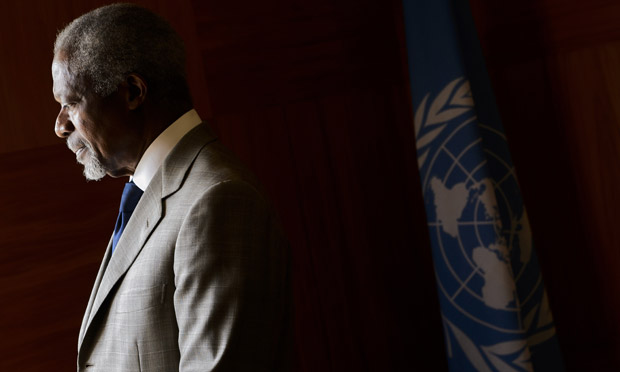Kofi Annan resigns as head of UN peace mission to Syriahttp://bit.ly/N5f6NF
Syria crisis: Kofi Annan resigns as peace envoy
• International mediator quits after failure to halt violence
• Scores of bodies found in two suburbs of Damascus
• Obama approves secret CIA support for Syrian rebels
• Fears of an all out assault on Aleppo
• Read the latest summary
• Scores of bodies found in two suburbs of Damascus
• Obama approves secret CIA support for Syrian rebels
• Fears of an all out assault on Aleppo
• Read the latest summary

Kofi Annan has announced that he will step down as international envoy on Syria on 31 August. Photograph: Fabrice Coffrini/AFP/Getty Images
Summary of the latest developments
SYRIA
• Kofi Annan has resigned as the international envoy on Syria, with effect from the end of the month. At a press conference in Geneva, Annan complained of "finger-pointing and name-calling". UN seceretary-general Ban Ki-moon says he is looking for someone to replace Annan.
• Continuing violence in Syria has had a devastating impact on agriculture, according to a report by the World Food Programme which warns that 1.5 million people will need urgent food aid over the next three to six months.
• Syria's banking sector is severely damaged and some parts of it have almost stopped functioning, Reuters reports: "There is little corporate lending or trade finance, but deposits and withdrawals continue."
• The former leader of the opposition Syrian National Council, Burhan Ghalioun, says that if Aleppo falls, "then automatically we are going to establish headquarters at the presidential palace".
• US defence secretary Leon Panetta met Jordan's King Abdullah this morning in Amman where they discussed prospects for a political transition in Syria after President Assad is gone, AP reports citing Panetta's spokesman.
Updated at 17:49 BST
Annan's resignation statement: full text
This is the statement delivered by Kofi Annan today in Geneva:
Five months ago, I was asked to take on the role of joint special envoy for Syria, in order to seek a peaceful solution to the crisis, an end to the killings of civilians, the human rights abuses, and a path towards a political transition.
I accepted this task, which some called “Mission Impossible” – for I believed it was a sacred duty to do whatever was in my power to help the Syrian people find a peaceful solution to this bloody conflict.
The severity of the humanitarian costs of the conflict, and the exceptional threats posed by this crisis to international peace and security, justified the attempts to secure a peaceful transition to a political settlement, however daunting the challenge.
The increasing militarisation on the ground and the clear lack of unity in the security council, have fundamentally changed the circumstances for the effective exercise of my role.
Yet the bloodshed continues, most of all because of the Syrian government’s intransigence, and continuing refusal to implement the six-point plan, and also because of the escalating military campaign of the opposition – all of which is compounded by the disunity of the international community.
At a time when we need – when the Syrian people desperately need action – there continues to be finger-pointing and name-calling in the Security Council.
The Geneva communiqué, endorsed by the action group for Syria on 30 June, provided an international agreement on a framework for a political transition. This should have been automatically endorsed by the security council and something the international community should have built on.
Without serious, purposeful and united international pressure, including from the powers of the region, it is impossible for me, or anyone, to compel the Syrian government in the first place, and also the opposition, to take the steps necessary to begin a political process.
You have to understand: as an envoy, I can’t want peace more than the protagonists, more than the security council or the international community for that matter.
I have therefore informed the secretary-general of the UN and secretary-general of the Arab League today that I do not intend to continue my mission when my mandate expires at the end of August.
My central concern, from the start – and I think I mentioned it to you – has been the welfare of the Syrian people. Syria can still be saved from the worst calamity – if the international community can show the courage and leadership necessary to compromise on their partial interests for the sake of the Syrian people - for the men, women and children who have already suffered far too much.
I would like to extend my appreciation and gratitude to both the secretary-general of the United Nations Ban Ki-moon and secretary-general ElAraby of the Arab League for their unflinching support and the grace and cordiality that they extended to me, having given me the opportunity to serve the cause of peace once again.







